[ad_1]
Providing a comfortable and functional coop is essential for flock health, safety, and well-being. The best chicken coop ideas take care of your chicken’s needs, and make caring for them easier for you. From “must have” features to fun ways to dress up your coop, we’ll share how to keep your hens happy.

DIY Chicken Coop Plan, Coop Kit, or Repurposed Building?
There are a LOT of different ways to provide a safe and comfortable shelter for your chickens.
Sometimes you can use a structure you already have available. For instance, children’s playhouses, dog houses, and swing sets have been repurposed for chicken coops. We turned an old generator housing into a mini seasonal coop.
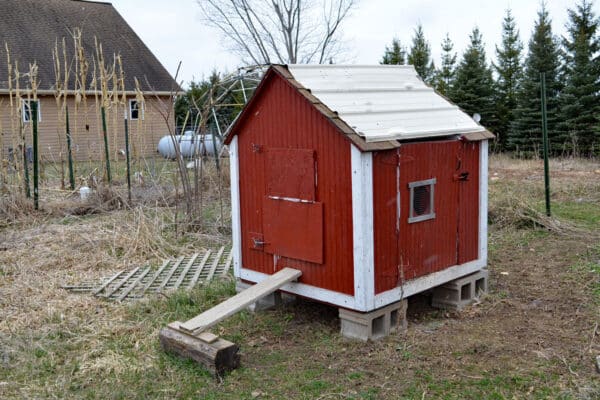
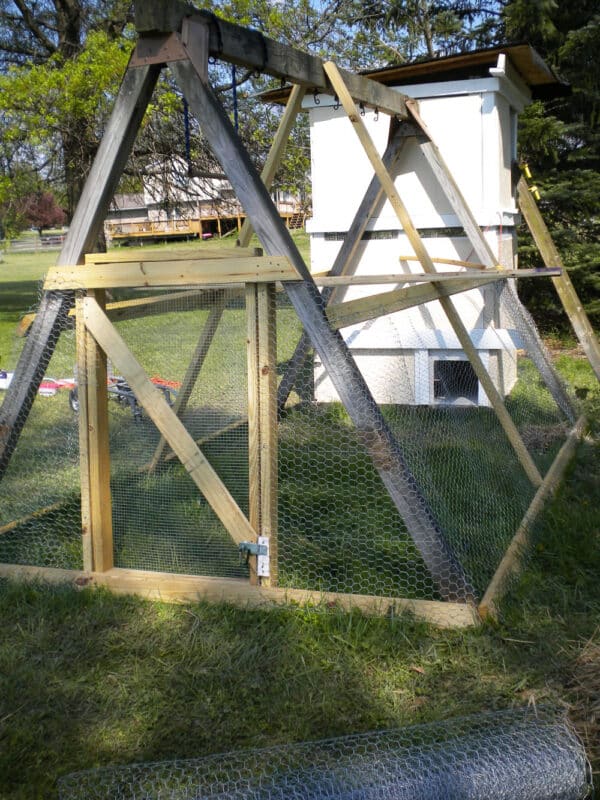

Another option is a premade coop, or a coop kit that’s ready to assemble. You may be able to find someone local selling coops, and some companies online ship assembled coops. Expect to pay a premium for new, fully assembled coops. If you’re willing to do the assembly yourself, you can save money.
We have a mid-sized coop from Tractor Supply that we use to move our hens to seasonal runs around the property. It’s light enough to move around with four strong people – or tractor forks. My sons put the kit together in an afternoon.
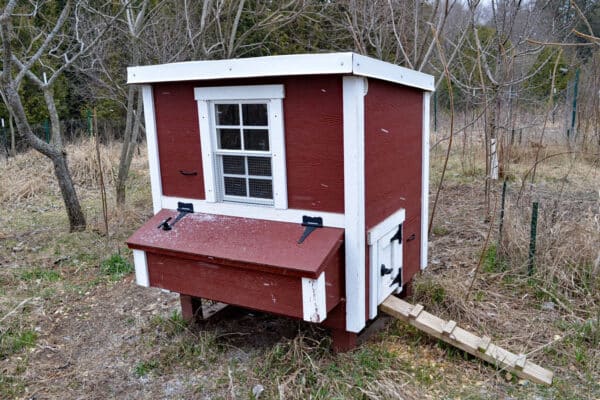
Free Coop Designs
If you’re handy, you can build a custom coop from the ground up. EasyCoops.com has a great list of over 40 free coop designs online. They also offer the plans in print format at a very reasonable price, complete with shopping list and foundation plans.
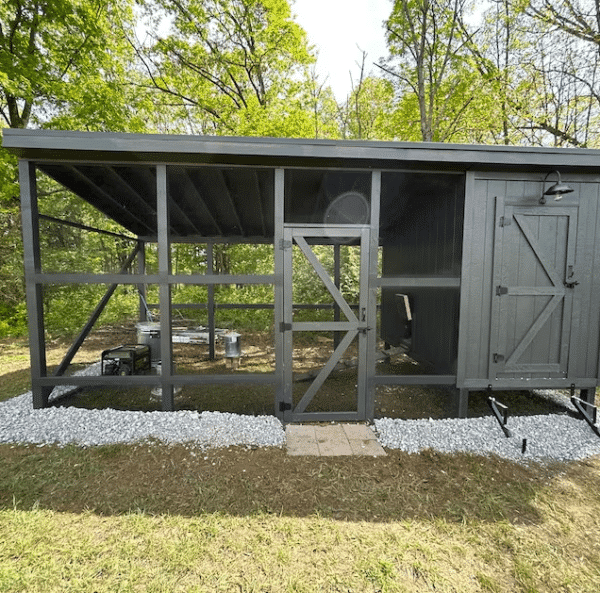
We’ve tackled lots of DIY builds over the years, and having that materials list up front can be a huge time and money saver. Once you know you have the basics covered, it’s easy to customize the coop to fit your yard.
Ideas for Customizing Your Chicken Coop
You’ve probably seen super cute chicken coop ideas on social media, but any coop design can be dressed up with a little creativity. Keep in mind that chickens LOVE to dust, so anything inside the coop should be washable.
Adding curtains to the nest boxes gives the hens privacy, and is an easy way to brighten up the space. Using sturdy natural branches for roosts adds visual interest, and the birds can grip them easily.
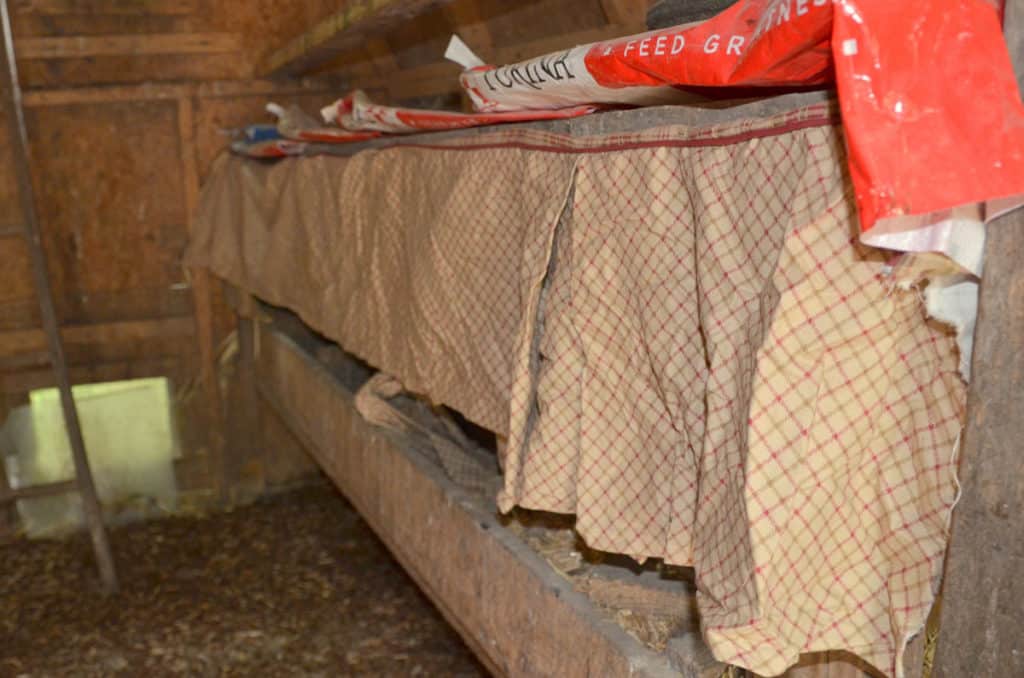
Inside or outside, using different paint colors is a simple way to customize your coop. Keep in mind that lighter colors inside will help boost light levels, a plus for improved laying.
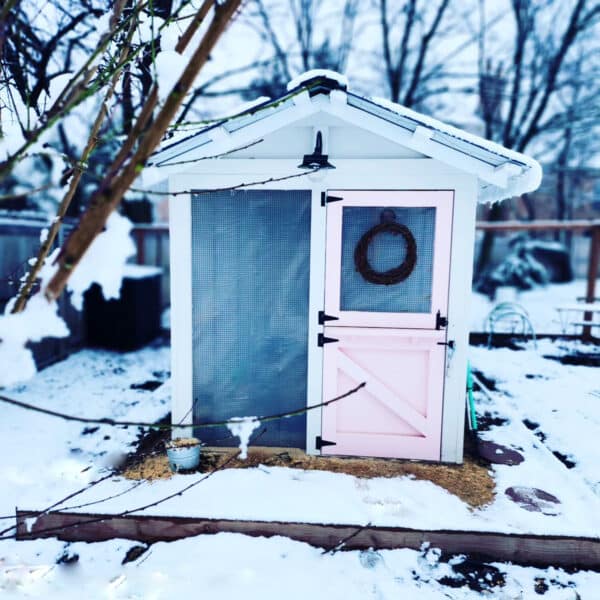
If you don’t have electricity run to your coop, you can buy solar coop lights for inside or outside the coop. Accessorize with upcycled items from thrift stores, online finds, and auctions.
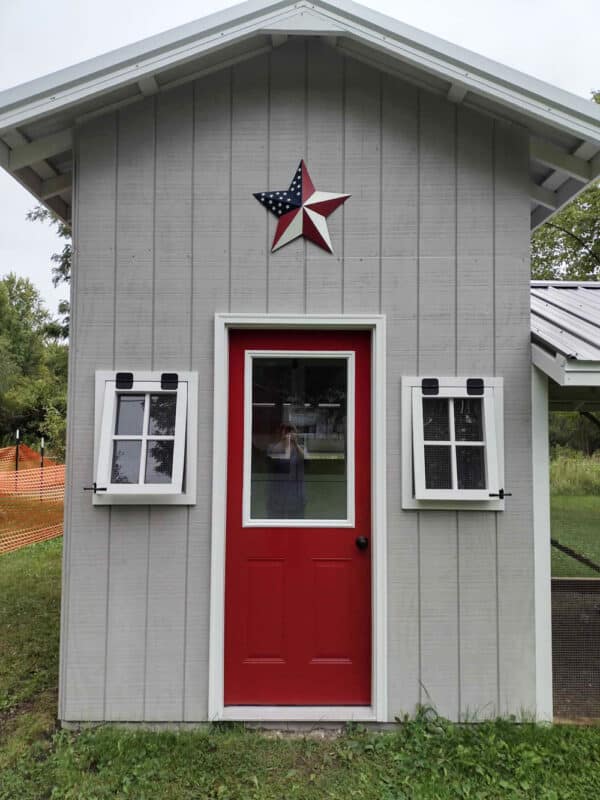
Chicken Coop Ideas – Things Every Coop Needs
Backyard coops take many different forms, but you need to include these elements:
- Enough space per chicken in the coop and enough space per chicken outside the coop
- Nesting boxes
- Roosting bars
- A door for you and a door for chickens (these can be the same or separate)
- Dusting area
- Predator protection
1. Space Requirements Per Chicken
Chickens need space to move and be “chicken”. They like to dig, they stretch their wings, they dust bathe and sit in the sun. As a general rule of thumb, allocate a minimum of 2-3 square feet of indoor space per chicken in the coop.
Think about how you will care for your chickens. Will they have deep bedding cleaned a few times per year, or shallow bedding cleaned more frequently? Can you reach all areas of the coop for cleaning?
Where will you set up their food and water? Will it be inside, or outside only? In our climate, the chickens get stuck inside when it gets too cold. We insulted the main coop to protect them from below zero temperatures.
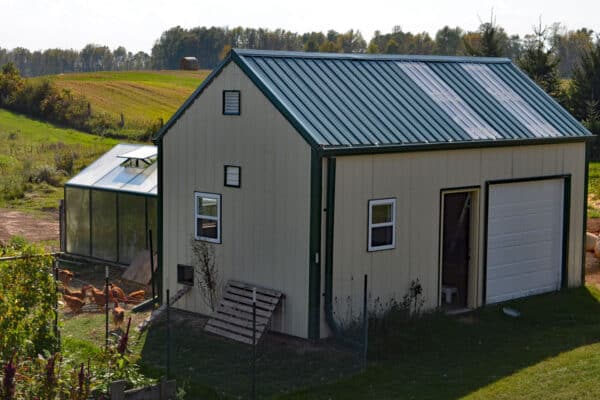
For the outdoor run area, aim for 8-10 square feet per chicken. However, more space is always beneficial, especially if you have larger breeds or want to prevent overcrowding.
Free ranging your chickens is another option, but may not be possible in some areas. Chickens are best kept out of gardens and other areas where you don’t want them to dig.
2. Nesting Boxes
Nesting boxes provide a cozy and private space for hens to lay their eggs. Including easily accessible nesting boxes into your coop design encourages nesting behavior and makes egg collection a breeze.
Install one nesting box for every 3-4 hens. Fill them with clean bedding material such as straw or wood shavings. You can also add fresh or dried herbs such as mugwort and oregano to deter mites and other pests.
Some people build the nest boxes so they can access them from outside the chicken coop for easy picking. This is helpful for small chicken coops. In cold weather climates, eggs in exterior boxes will be more likely to freeze.
See Chicken Nesting Boxes for more photos and ideas for nests.
3. Roosting Bars
Chickens naturally prefer to roost off the ground at night to feel secure and avoid potential predators. Install sturdy roosting bars inside the coop. Position the bars higher than the nesting boxes, with enough space for each chicken to perch comfortably. Opt for rounded or flat roosting bars to prevent foot injuries and facilitate easy cleaning.

4. Door Placement
When placing doors and windows, think about ventilation, natural light exposure, and ease of access. Placing doors on opposite sides of the coop promotes cross ventilation, preventing moisture buildup. If you only have one door, add a window or vent to improve air flow.
Make sure you have a larger access door for cleaning, egg collection, and maintenance tasks. In our coops, we have one human sized door and one chicken door. Our main coop is easy to access with a wheelbarrow for cleaning the deep litter.
See “Quick Lock Chicken Door” for our predator resistant door design.

5. Dusting Area
Chickens naturally roll in dust to reduce parasites and improve feather health. You can set up a dusting area inside or outside the chicken coop. Outside areas keep the mess outside, which is nice, but an inside bin is helpful for cold climates. Place outside bins under cover, or raise them up so they dry quickly.
Use a bin or hole 12-18 inches deep and fill it with fine material, like sand or peat moss. Include some diatomaceous earth or wood ashes for extra pest fighting power. We have a rubber tub half buried in our coop’s deep litter. The chickens also dig their own dusting areas in their runs.
6. Predator Protection
How much protection your flock needs will depend on what predators are active in your area. At the very least, they should be able to go in at night to a secure coop. Most poultry predators are more active at night.
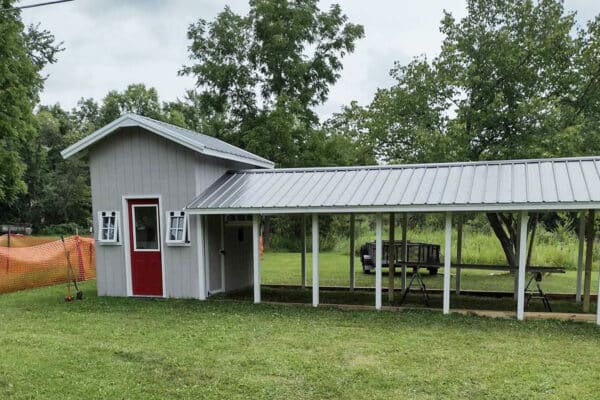
If you have birds of prey, you may need a covered run. For digging predators such as mink, you need sturdy materials such as wood, concrete, or hardware cloth to keep them out.
Run Suggestions
An attached outdoor run provides chickens with space to stretch their wings, forage for bugs, and enjoy the outdoors safely. Enhance your chicken run with features such as:
Covered Area: Provide shelter from sun, rain, and predators by incorporating a covered section into the outdoor run. Use materials like corrugated metal or durable outdoor fabric to create a weatherproof roof. We have a pallet with a piece of salvaged siding propped up on concrete blocks to provide a simple covered area.
Perches and Enrichment: Introduce natural elements like branches, stumps, and rocks for chickens to perch on and explore. Rotate toys, hanging treats, and boredom busters to keep chickens mentally stimulated and entertained. Our chickens love picking the berries off of autumnberry branches placed into their run.
Fodder mats: For small runs, you can grow mats of sprouts or other fodder outside the run. Then when the plants are big enough for snacking, move them into the run so the chickens have access to fresh greens. Learn more in 50 Do-It-Yourself Projects for Keeping Chickens.
Remember, when you’re brainstorming chicken coop ideas, think about how your design will hold up to years of caring for your feathered friends. Consider whether or not you want lighting, and if you do, how to provide it. Make sure there’s enough room, and you have access for cleaning. A little extra planning up front makes chicken care much easier down the road.
More on Backyard Chickens
Raising Chickens – The Easy Guide for Beginners
Raising Chickens on a Tight Budget
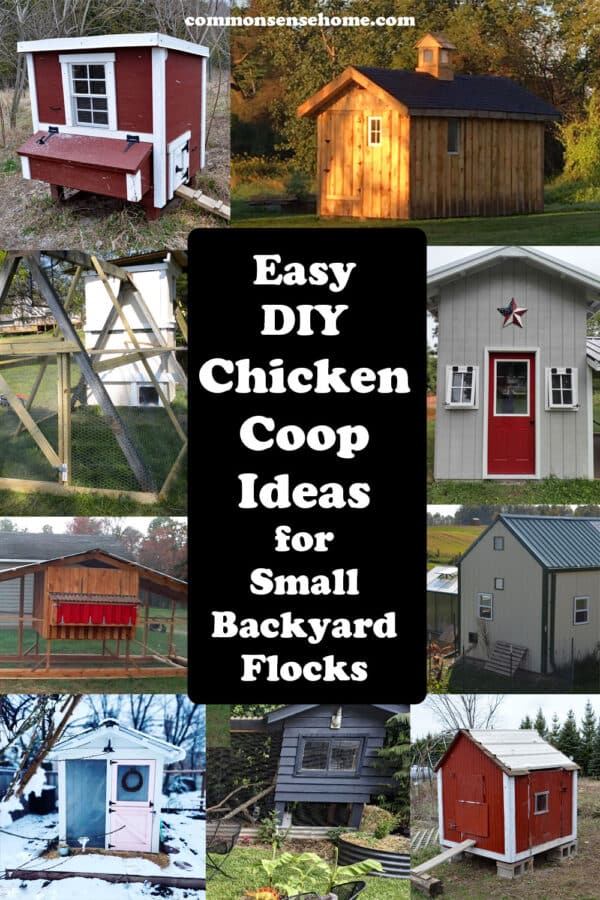

This article is by Laurie Neverman. Laurie grew up on a small dairy farm in northwest Wisconsin, and now lives on a 35 acre homestead in northeast Wisconsin. Their family raises meat chickens, laying hens, and ducks. They use solar water heating and line drying, root cellaring and freeze drying, annual gardens and permaculture.
[ad_2]
Source link
Get more stuff like this
in your inbox
Don't Be Left Unprepared
Thank you for subscribing.
Something went wrong.



